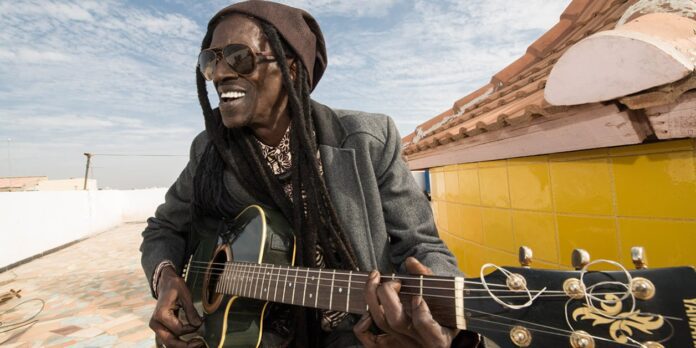Located one hour from Dakar, at the entrance to the Cape Verde peninsula, artist Cheikh Lô's house is served by a street that bears his own name! Originally from Bobo-Dioulasso, Burkina Faso, he moved to Dakar as a teenager. Self-taught musician, whose career began in the late 1990s, since then he has toured international stages, singing in Wolof, English and French, mixing musical registers, and inviting to his side voices such as Oumou Sangaré, Flavia Coelho, or more recently Adiouza . In his home studio, music is also a family affair: his young son is a sound engineer and his daughter, while studying, is already trying to sing.
Jeune Afrique: Why did you choose to settle here, in Keur Massar?
Sheikh Lo: I built this house in 2000. It will be twenty-three years, in December, that I have lived there with my little family. Before I was in Mamelles [quartier périphérique du center-ville in Dakar]. But Dakar, at a certain point, became uninhabitable. It was the beginning of traffic jams. Imagine that at that time at least 100 cars arrived at the port every day to be put into circulation. To trick things, President Abdoulaye Wade created highways and expanded roads. But, in the final analysis, we also have traffic jams here, and this also happened further away, in the regions. Everyone wants to have autonomy, to have their own car, not to use transport all the time.
You perform regularly on the Dakar stage, as well as touring internationally. After almost fifty years of career, how did you approach acting on stage?
As always…for forty-eight years. Within two years, I celebrated my 50th birthday on stage. I intend to invite many people, here in Dakar, with whom I have collaborated over all these years. I did this on my 40th birthday during a big show at the station. He had just won the Womex award in its 15th edition, it was the first time that an African had received this trophy. Fifty years is half a century dedicated to music! I also celebrated my 70th birthday. Lots to celebrate.
On stage you cover several classics from your repertoire, adapting them mainly to salsa rhythms. How do you approach your music and its multiple influences?
In today's music, there are only fusions. Music never had borders. It is the only universal language. Yesterday, for example, on stage in Dakar, I played with three Senegalese people – the percussionist, the guitarist and the drummer. The trumpeter is Congolese, the bassist is Cameroonian, the keyboardist is Nigerian. We don't speak the same language, but once on stage we practice music. Language is notes, chords. Even if you don't know how to explain it in the same language, you make the agreement, and another person will understand the picture of emotions you want to convey. People of different nationalities can communicate in front of thousands of people without speaking the same language.
Salsa is one of the influences that can be found a lot in his music and performances.
Salsa has been practiced in Africa for a long time. It was fashionable in the 1960s and 1970s, we listened to Bembeya Jazz, Tabu Ley Rochereau, Las Maravillas de Mali. Everyone played salsa, but with their tongue. Guinea's Bembeya Jazz was supported by former president Sékou Touré. He took an orchestra to Cuba so the musicians could train. One of his albums was called Authenticity 73, other Looking into the past. This music and its rhythm, played throughout the Caribbean and the Americas, comes from Africa.

Cheikh Lô, in Dakar in 2010. © Youri Lenquette
How do you compose these musical fusions?
I believe you must already be a good musician, a good instrumentalist who doesn't cheat, who knows what he's playing, who knows where to put his foot. I compose all my first songs with my guitar and my voice. Then I go to the studio and call musicians for each musical style in my repertoire. The musicians on the album and on stage are not necessarily the same. Because one or the other travels and must be replaced. It's hard to make music here: there aren't enough festivals or stages. And you have to play a lot to be able to win anything.
You are currently preparing your next album, announced for 2023.
We are in the mixing phase. We hope it won't take too long and will be released before the end of the year. I have a surprise. The only thing I can say is that there is one person I will honor on this album; an American friend, saxophonist, who passed away in 2021, who played with James Brown. When James Brown died, Pee Wee Ellis, who was then living in London, contacted me to cover a piece by this world-renowned music legend, alongside musicians such as Maceo Parker.
Choosing an African to celebrate James Brown on a European and American tour, when many Americans could have done so, is considering that this person can bring an originality that will sound different to the things we hear. It was an honor. And we did this in 2008-2009. On my new album, I pay tribute to Pee Wee Ellis, who also played on three of my albums, including Bambay Gueej. We recorded together at the time in Youssou N'dour's studio.
Last November you covered a track from your latest album Balbalou, released in 2015, with a young artist, Adiouza.
I wanted a female voice to update the love song “Geumoumako” (“I don’t believe” in French). This enchanted me mainly because his father is an important person. When I arrived at college, first in Rufisque, I met Senegal's first musician, Ousmane Diallo, known by the name Ouza. He is Adiouza's father. I played with his father, I was his drummer. He sang and also played the saxophone from time to time. It was wonderful.
Data from the end of the 1970s. Adiouza had not yet been born. Today she is an artist with a lot of courage, a fighter. She also plays the piano. For me, being a musician gives me an opening when it comes to singing, so I can better understand the music, the notes, the chords.
How do you define it? First as a musician or as a singer?
Firstly a musician. I played drums with a lot of people. And on my records I play almost all the drums, and also congas and timpani – my first instruments.
How does a song like “M'Bedeemi”, released in 1999, resonate today?
He talks about the street, about people who lived in houses, who were in good situations, but who suddenly became homeless. Is someone who lives on the street crazy? Ask the question to those not in power. You who recognize who is crazy and who is not, try to save these people. “M'Bedeemi” evokes this, but with joy.
How do you look at it success with a title like “Né la Thiass”?
This is my favorite song, the one from my first musical friendship here in Senegal. My first, first album. At the time, it was on cassette, released in December 1990. Every December, artists released the tapes to end the year in style. There were almost 20 other artists releasing something and competing for Best New Talent. I was the first new talent in Senegal. When the album Born in Thiass was released, Youssou N'dour was the king of mbalax at the time. It brought another touch never heard before in Senegalese music, different from everything we expected and heard. And my music was broadcast on the only television channel, Senegalese radio-television (RTS).
I started playing in a well-known place at the time, Tringa. I was there every Friday, playing acoustic, with my guitar. To my great surprise, one night, Youssou N'dour was there. He listens to me. I finish, put my guitar away and someone calls me “Youssou needs you”. I met him and he told me, “I like what you do. Do you have a model? » I made him listen to a model, with different styles. And Youssou answers me: “We will produce. » In this model there is “Doxandem”. If the title already existed, we put it back on the album Born La Thiass five years later. Everyone wanted to produce this album. As we were in collaboration with Youssou N'dour, he did the negotiation. All but one of my albums have been produced by World Circuit Records in London.
Why does this song still resonate so much today?
In music there are songs, you know they will be hits. A tube does not die. “Né La Thiass”, as soon as it was released, entered the museum. And everything that enters the museum becomes immortal.
Under what conditions do you write?
I don't have any trade secrets. I sing what you observe, what I feel in life. I also think about the text, the rhymes too. And everything is learned. I've never had a teacher for anything in my life. I'm a self-taught musician. And there are a lot of people who went to school and don't play the drums better than me. I learned music, I understood. I know my chords on the guitar. I can play piano and drums, of course. I would like to learn saxophone.
In his music we also find baye fall rhythms.
The Bayes Autumn has another approach with what we call khines (traditional Senegalese drum), it's another resonance. It's not very high-pitched, unlike the percussions we usually hear in Senegal. It's more whimsical, more tense. You hear the bass. The sonic difference also comes from the fact that, generally, the percussion here is made with goat skin, while Baye Fall's khines are made with cow skin. The resonance is completely different. Because goat is capricious (laughter).
What does it mean to be a Baye Fall artist today?
Isn't Baye Fall supposed to be an artist? Maybe that's what some will say. Everyone has their own opinion, their faith. And it has nothing to do with music. Maybe sometimes you feel your faith reflected in your music. It's still music.
How do you read the situation in Senegal today?
I didn't wait for the country to start asking to talk about it. I spoke two years ago when the problems arose here in Senegal. I spoke about this, I made a video speaking directly with the President of the Republic, Macky Sall [« Mon message pour jamm si Sénégal » – « Mon message pour la paix au Sénégal »]UE. And I warned him, I gave him my advice on what can be fixed, my advice on how to bring peace. When you tell him, do your best so this country doesn't burn in your hands.
Whether he listens to me or not, the main thing for me is that I have fulfilled my duty as a spokesman. I did not expect, like many people today, that deaths, injuries and much damage; no, we must warn before it is too late. I don't know if I listened or not, but I'm not going to repeat the same song. Talking too much at some point means talking without saying anything because your message is not getting across. If you have personality, you abstain, speak once. He did not understand? You let him do it, he will understand A day.

